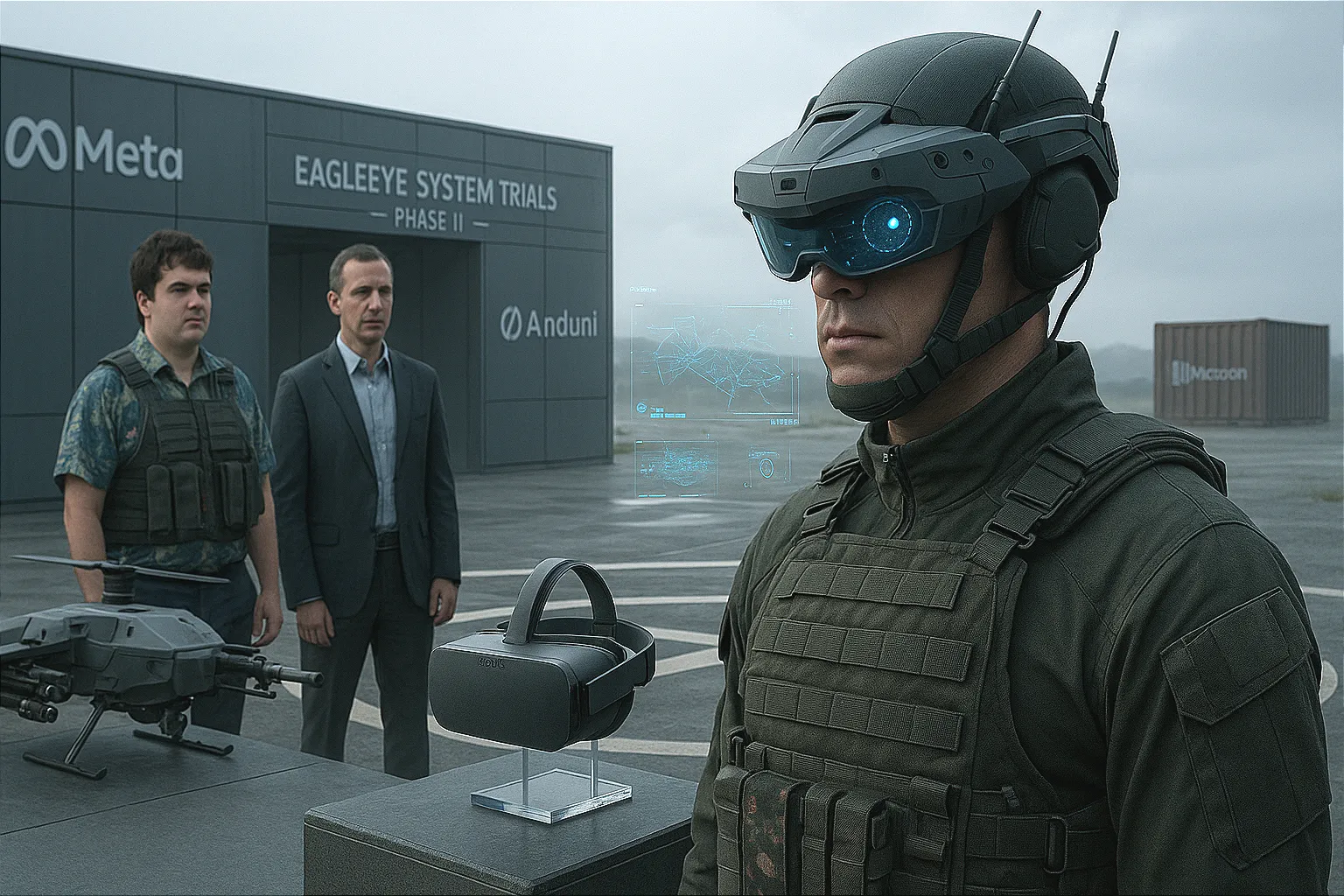💡 TL;DR - The 30 Seconds Version
🤝 Meta teams up with Anduril to build military VR headsets called EagleEye, reuniting with Palmer Luckey eight years after firing him.
💰 The partnership targets a $100 million Army contract as part of a massive $22 billion military wearables program worth billions over ten years.
🔧 Anduril took control from Microsoft in February 2025 after years of failed headset delivery, reducing software update times from 180 days to 18 hours.
🎯 EagleEye headsets detect drones miles away, spot hidden targets, and let soldiers control AI weapon systems through real-time battlefield intelligence displays.
🏭 Meta spent $13.7 billion on VR development last year alone, making military contracts a potential path to justify massive Reality Labs losses.
🚀 The deal signals Silicon Valley's shift from anti-war sentiment to competing for defense contracts under Trump's push for commercial military technology.
Palmer Luckey got fired from Facebook in 2017 for backing Trump. Now he's back working with Meta to build high-tech headsets for the U.S. Army.
The partnership brings together Meta and Luckey's defense company Anduril to create something called EagleEye. Think Call of Duty goggles meets real battlefield tech. These aren't gaming headsets. They're military-grade devices that let soldiers see drones miles away, spot hidden targets, and control AI weapon systems.
Luckey's company just wrestled control of a massive $22 billion Army contract away from Microsoft, which spent years failing to deliver working headsets. Now Anduril leads the program, and if Meta wants in on military VR, it has to go through Luckey's company.
The Tech Behind the Comeback
"I finally got all my toys back," Luckey said. He's not wrong. The partnership gives him access to his original Oculus designs plus all the tech Meta built after firing him. It's a remarkable reversal of fortune for someone who was once Silicon Valley's most prominent conservative outcast.
The EagleEye system combines Meta's Reality Labs hardware with Anduril's Lattice software platform. Soldiers get a heads-up display of battlefield intelligence in real-time. The headsets can enhance hearing and vision, detect incoming threats, and provide intuitive control of autonomous weapons. Meta's Llama AI models power the intelligence features.
Both companies funded the development privately, without taxpayer money. They've already submitted a joint bid for a $100 million Army contract for VR hardware prototypes. Win or lose, Anduril says the partnership continues. Other military branches want the technology too.
Meta's Defense Push
The collaboration marks Meta's biggest push into defense work. The company recently opened its AI models for military use and hired former Pentagon officials to navigate defense contracts. CEO Mark Zuckerberg said the technology will help American soldiers "protect our interests at home and abroad."
For Silicon Valley, this represents a broader shift. The industry's anti-war sentiment from the Iraq era has faded. Tech companies now compete for defense contracts, especially under Trump's administration, which pushes the military to adopt commercial technology faster.
From Outcast to Power Player
Luckey's story reads like a Silicon Valley revenge plot. He founded Oculus at 15 and sold it to Facebook for $2 billion at 21. Then came the 2016 election. Luckey donated to an anti-Hillary Clinton group, triggering an internal campaign to remove him. Facebook fired him despite his protests that the donation was personal, not political.
He used his Oculus money to start Anduril in 2017, naming it after a sword from Lord of the Rings. The company builds autonomous weapons and defense systems. Luckey bet that Trump's return would create opportunities for defense startups. He was right.
Microsoft's $22 Billion Failure
The military contract Anduril now leads was originally worth $22 billion over ten years. Microsoft won it in 2018 with promises to adapt its HoloLens technology for soldiers. But the headsets didn't work properly. Soldiers complained about weight, battery life, and software bugs. Some units reportedly made soldiers sick.
The Army stripped Microsoft of program leadership in February and handed it to Anduril. Software updates that once took 180 days now reach soldiers in 18 hours. Lattice-integrated headsets are already in testing.
The Perfect Partnership
The partnership with Meta accelerates development. Meta brings a decade of VR hardware experience and AI capabilities. Anduril contributes battlefield software and military procurement knowledge. Together, they can deliver what Microsoft couldn't.
Luckey's investors initially told him to focus on software instead of hardware when he started Anduril. They thought he was too focused on "winning a pissing contest" over VR's future. Now that pissing contest has become a Pentagon contract worth billions.
Bigger Than One Man's Revenge
The broader implications extend beyond one man's vindication. America's military relies on technological superiority to maintain its edge. As computing shifts toward AI and wearable devices, keeping that advantage requires partnerships between Silicon Valley and the Pentagon.
China invests heavily in military AI and autonomous systems. American defense contractors traditionally move slowly, hampered by bureaucracy and risk aversion. Startups like Anduril promise faster innovation by adapting commercial technology for military use.
The Trump administration encourages this approach. Officials want the military to buy more from venture-backed startups and less from established defense giants like Lockheed Martin and Boeing. The goal is to save money while accelerating innovation.
Silicon Valley's Defense Gold Rush
Other tech companies are following Meta's lead. Anduril partners with OpenAI, Oracle, and Palantir on various defense projects. The company is reportedly among the candidates to help build Trump's "Golden Dome" missile defense system.
For Meta, defense work offers a new revenue source beyond advertising. The company spent $13.7 billion on Reality Labs last year, mostly losing money on VR and AR development. Military contracts could help justify those investments.
The partnership also helps Meta's relationship with Trump's administration. The company faced years of regulatory scrutiny and antitrust investigations. Working with the military demonstrates patriotic commitment and could ease political pressure.
The New Rules of Tech
Luckey's transformation from Silicon Valley pariah to Pentagon favorite reflects broader changes in American tech culture. The industry's libertarian idealism has given way to more pragmatic nationalism. Companies that once avoided government work now compete for it.
The EagleEye headsets won't ship immediately. Military procurement moves slowly, even with startup involvement. But the partnership signals a new phase in the relationship between big tech and national defense.
Eight years after Facebook fired him for political donations, Palmer Luckey has engineered his return. He's not just working with his former employer again. He's leading the partnership. Meta needs Anduril more than Anduril needs Meta.
Why this matters:
- Palmer Luckey's comeback story illustrates how quickly Silicon Valley's political landscape has shifted—what got him fired in 2017 now makes him valuable in 2025.
- The partnership shows that military contracts have become the new gold rush for tech companies looking beyond their traditional revenue streams, especially as regulatory pressure mounts on Big Tech.
❓ Frequently Asked Questions
Q: What exactly did Palmer Luckey do to get fired from Facebook?
A: Luckey donated money to a group that created anti-Hillary Clinton memes during the 2016 election. He also publicly supported Donald Trump, which triggered an internal campaign at Facebook to remove him. Facebook fired him in 2017 despite his claims the donation was personal.
Q: How much money is this military headset contract actually worth?
A: The immediate Army contract bid is worth up to $100 million for VR hardware prototypes. But it's part of a much larger $22 billion, 10-year Army wearables program called SBMC Next that Anduril now leads after Microsoft lost control in February 2025.
Q: Why did Microsoft lose the original military headset contract?
A: Microsoft's HoloLens-based headsets didn't work properly for soldiers. They were too heavy, had poor battery life, and software bugs. Some units reportedly made soldiers sick. Software updates took 180 days to reach the field. The Army stripped Microsoft of program leadership in February.
Q: What can these EagleEye headsets actually do that's different from gaming VR?
A: EagleEye headsets detect drones flying miles away, spot hidden targets, and let soldiers control AI weapon systems. They provide real-time battlefield intelligence through heads-up displays and enhance hearing and vision. Unlike gaming headsets, they're ruggedized for combat conditions.
Q: How much has Meta lost on VR technology so far?
A: Meta spent $13.7 billion on its Reality Labs division last year alone, mostly losing money on VR and AR development. The company has invested over $50 billion in VR/AR since buying Oculus in 2014. Military contracts could help justify these massive investments.












